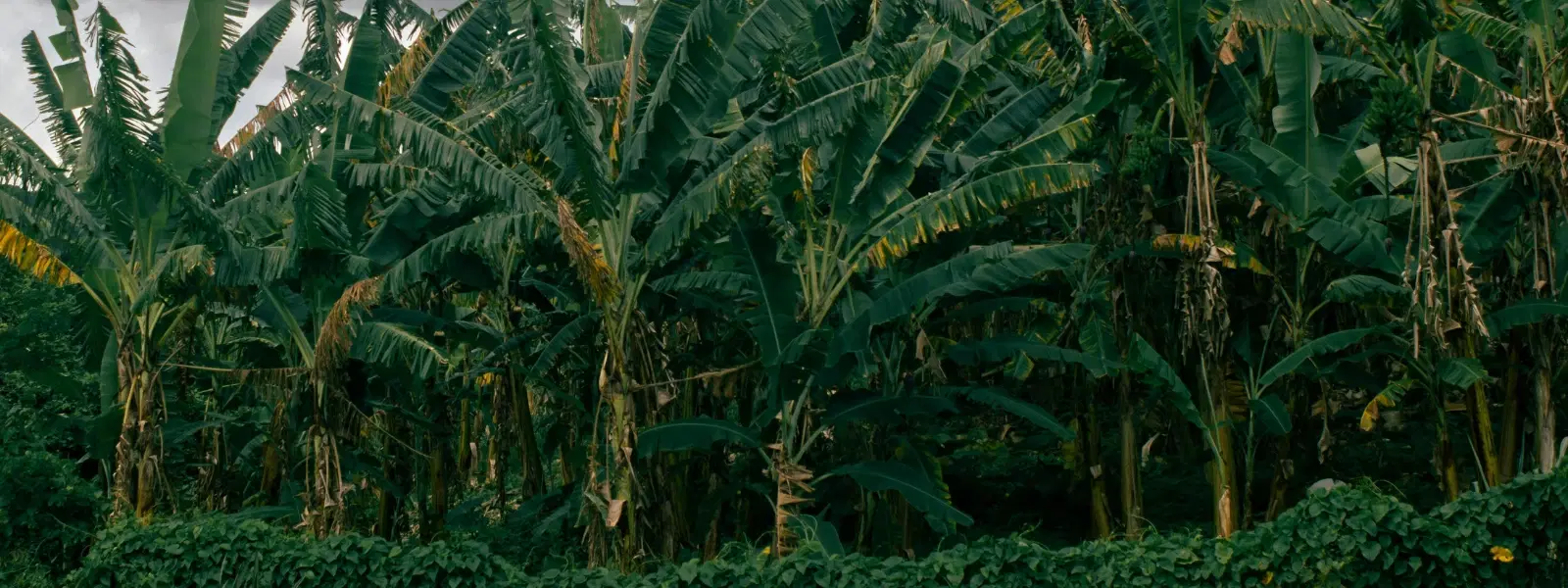
Flights
•04 min read

Imagine strolling through lush, verdant fields under a radiant tropical sun, where rows of banana trees sway gently in the breeze. The journey from *banana plantations to visit* offers not only a visual feast but also an immersive dive into the world of agricultural tourism. In this blog post, we explore the magic of banana plantations, answering your most common questions about farm tours, sustainable banana farming, and the unique experiences that await you on these tropical escapes.
Tropical fruit plantations captivate visitors with their vibrant greenery and the fascinating blend of agriculture, tourism, and sustainability. Banana plantations are special because they offer a peek into the heart of the banana harvesting process. They showcase the cultural significance of bananas in many societies and the innovative ways farmers integrate eco-friendly practices with traditional methods. The harmonious mix of nature and culture creates an enchanting setting that appeals to wanderers, planners, professionals, and luxury seekers alike.
Banana production thrives in various parts of the world. From the lush plantations of Costa Rica, known for their expansive organic banana farms, to Madeira’s eco-friendly plantations and Tenerife’s unique banana museum visits, each region offers a distinctive experience. India too boasts thriving banana production areas, with Tamil Nadu celebrated for its renowned Nendran bananas. These diverse regions not only showcase the breadth of the banana industry but also highlight how local agricultural traditions shape the landscape.
A visit to a banana plantation is an educational adventure loaded with sensory delights. Visitors often indulge in activities like watching the banana harvesting process up-close, experiencing guided tours that reveal the intricacies of eco-friendly farming practices, and sampling freshly harvested fruit. Some destinations even offer exclusive experiences, such as tasting banana wine or liqueur in Tenerife, or exploring specialized exhibits in local banana museums. These plantation tours and activities allow visitors to appreciate every step of the banana journey from tree to table.
Beyond traditional tours, banana plantations offer hands-on fruit farm experiences that engage all senses. Families can enjoy child-friendly tours, where kids learn about sustainable agriculture in a fun setting, while groups can join guided walks that delve into the natural history of the plantation. These immersive experiences ensure that each visitor comes away with a deeper understanding of the cultivation process and a lasting connection to the land.

Organic banana farms play a pivotal role in maintaining healthy ecosystems. By avoiding chemical pesticides and synthetic fertilizers, these farms protect local biodiversity and produce bananas that are both nutritious and environmentally friendly. Many plantations are now committed to sustainability, embracing organic practices that support both the planet and the local community. This commitment not only improves the quality of the produce but also aligns with the growing global demand for eco-friendly agriculture.
Eco-friendly plantations make significant contributions to environmental conservation. Many innovators in banana production are incorporating water conservation methods, renewable energy sources, and efficient waste management systems. These initiatives help reduce the carbon footprint of agricultural tourism while preserving the natural beauty of the landscape. Such efforts reassure travelers that exploring these plantations is a step toward supporting a greener future.
The question, “What is the season for bananas?” often arises among travelers. While bananas are cultivated year-round in tropical climates, there are peak harvesting periods depending on the region. For instance, Costa Rica experiences its most active banana season from March to October, when the plantations are at their most vibrant. Checking local calendars before planning your visit can ensure a richer experience full of freshly picked, aromatic bananas.
Selecting the ideal banana farm tours depends on your interests. If you crave sustainable travel experiences, opt for plantations that emphasize eco-friendly practices. For a cultural deep-dive, seek tours that incorporate local traditions and community insights. Consider factors like accessibility, tour duration, and additional offerings such as dining options or well-curated gift shops. Each tour provides a unique perspective on the vibrant world of banana production, ensuring there is a perfect match for every type of traveler.
Did you know that banana plantations are among the most sustainable agricultural tourism destinations? Their eco-friendly practices and cultural significance make them ideal for travelers seeking meaningful experiences.
-95e61ea7-ab4c-459c-9b20-5d183cfc507b.png&w=3840&q=75)
Most banana plantations are located in tropical regions, including Central and South America, Southeast Asia, and parts of Africa. Popular destinations include Costa Rica, India, and Madeira.
Tamil Nadu is renowned for producing some of the best bananas in India, particularly the Nendran variety, which is highly sought after for its flavor and quality.
Bananas are grown year-round in tropical climates, but peak harvesting seasons vary by region. For example, Costa Rica’s banana harvest is most active from March to October.
Yes, Madeira offers several banana farm tours where visitors can explore plantations, learn about banana cultivation, and enjoy local banana-based products.
Activities typically include guided tours, banana harvesting demonstrations, fruit tasting, eco-friendly farming insights, and sometimes unique experiences like banana wine sampling or museum visits.
Banana plantations offer a charming fusion of nature, agriculture, and sustainability. From exploring vibrant tropical fruit plantations in various global banana growing regions to enjoying hands-on fruit farm experiences and eco-friendly tours, visitors gain invaluable insight into the banana harvesting process and the care that goes into sustainable farming. This guide serves as an invitation to uncover the beauty and educational potential of these agricultural destinations, inspiring your next tropical adventure.